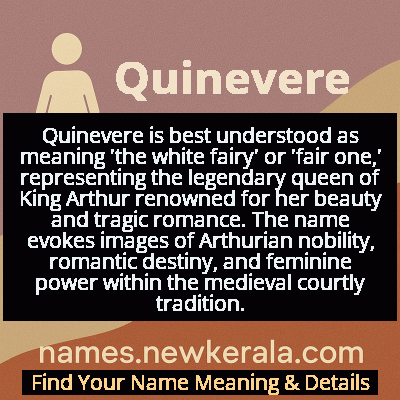Quinevere Name Meaning & Details
Origin, Popularity, Numerology Analysis & Name Meaning of Quinevere
Discover the origin, meaning, and cultural significance of the name QUINEVERE. Delve into its historical roots and explore the lasting impact it has had on communities and traditions.
Name
Quinevere
Gender
Female
Origin
Arthurian
Lucky Number
8
Meaning of the Name - Quinevere
Quinevere is best understood as meaning 'the white fairy' or 'fair one,' representing the legendary queen of King Arthur renowned for her beauty and tragic romance. The name evokes images of Arthurian nobility, romantic destiny, and feminine power within the medieval courtly tradition.
Quinevere - Complete Numerology Analysis
Your Numerology Number
Based on Pythagorean Numerology System
Ruling Planet
Saturn
Positive Nature
Ambitious, efficient, realistic, and authoritative.
Negative Traits
Materialistic, stressed, confrontational, and can be overly ambitious.
Lucky Colours
Dark blue, black.
Lucky Days
Saturday.
Lucky Stones
Blue sapphire, amethyst.
Harmony Numbers
2, 4, 6.
Best Suited Professions
Business leaders, managers, financial services, law enforcement.
What People Like About You
Leadership, determination, organizational skills.
Famous People Named Quinevere
Guinevere (Legendary)
Queen of Camelot
Central figure in Arthurian legends whose love affair with Lancelot contributed to Camelot's downfall
Guinevere Turner
Actress and Screenwriter
Prominent figure in independent cinema and television writing
Guinevere van Seenus
Fashion Model
Internationally successful model featured in major fashion campaigns worldwide
Name Variations & International Equivalents
Click on blue names to explore their detailed meanings. Gray names with will be available soon.
Cultural & Historical Significance
In Arthurian tradition, Guinevere symbolizes both the ideal of courtly love and its potential for destructive consequences. Her abduction in various versions of the legend highlights her importance as a political figure whose possession signifies legitimate rule. The tension between her roles as faithful queen and passionate lover has made her a rich subject for artistic interpretation, representing the eternal conflict between personal desire and public duty. Her ultimate fate—whether returning to Arthur, entering a convent, or meeting other ends—varies across traditions but consistently underscores her central importance to the Arthurian narrative and its themes of redemption, betrayal, and the costs of idealized love.
Extended Personality Analysis
Those bearing the name Guinevere are often associated with a combination of grace, intelligence, and emotional depth. They typically possess a natural elegance and commanding presence that draws attention, coupled with a thoughtful, introspective nature. These individuals tend to be romantic idealists who value deep emotional connections and meaningful relationships, though they may struggle with balancing their personal desires with external expectations. Their strong sense of loyalty is matched by equally strong personal convictions, making them both devoted and occasionally conflicted in their relationships.
The legendary associations lend Guinevere-named individuals an air of sophistication and historical depth. They often demonstrate artistic sensibilities, appreciation for beauty, and cultural refinement. Their complex emotional landscape makes them deeply empathetic yet sometimes prone to intense emotional experiences. In social settings, they typically exhibit charm and diplomacy, while in personal relationships they value authenticity and profound connection. The name's royal connotations often manifest as natural leadership qualities and a sense of responsibility toward others, though they may prefer to lead through inspiration and personal example rather than authority alone.
Modern Usage & Popularity
Guinevere maintains a distinctive presence in modern naming practices, appealing to parents seeking names with literary prestige and historical depth without being overly common. While it has never reached the popularity of its derivative 'Jennifer', which dominated naming charts in the 1970s and 80s, Guinevere has experienced a modest revival in recent decades as part of the trend toward mythological and Arthurian names. The name is particularly favored in educated and artistic circles where its rich associations are appreciated. Current usage shows it appearing more frequently in birth announcements in English-speaking countries, often with nickname options like 'Gwen' or 'Gwenny' providing modern accessibility. The name's staying power demonstrates the enduring appeal of Arthurian legend and the preference for names that combine romantic sound with substantial cultural heritage.
Symbolic & Spiritual Meanings
Symbolically, Guinevere represents the duality of feminine power—both life-giving and destructive, loyal and passionate, regal and human. She embodies the Celtic concept of sovereignty where the queen's virtue directly affects the kingdom's prosperity, making her a symbol of the connection between personal morality and political stability. The name carries connotations of transformative love that challenges social conventions, the price of beauty and desire, and the complex negotiation between personal fulfillment and public responsibility. Guinevere symbolizes the idea that even in paradise (Camelot), human frailty and passion can lead to downfall, making her a timeless representation of the tragic dimensions of love and the inevitable imperfections within any utopian ideal.

